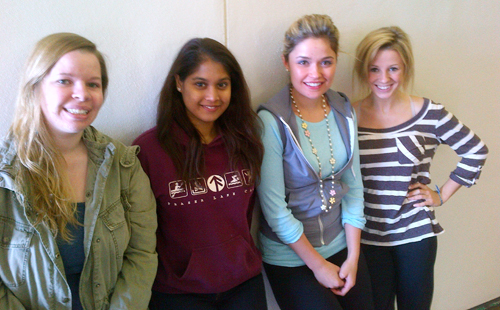
What big questions do you have about your life? What questions are other people asking? And who can help you find answers?
The U of G’s Multi-Faith Resource Team has joined with other campus groups as part of an international push to encourage conversations about the big questions of life.
Marty Molengraaf, one of the ecumenical campus ministers, says he first introduced this idea more than a year ago. “Our mistake at that time, though, was that we decided to come up with the questions we thought students should be asking. That had only limited success.”
After that struggling start, student Hava Goldberg, who was a member of the Multi-Faith Resource Team at the time, discovered that the Einhorn Family Charitable Trust in the U.S. was offering money for projects to encourage people to have discussions that could create a better world, using the Ask Big Questions approach.
Their website explains: “Can we change the world through better conversation? We believe we can…By having conversations around life’s ‘Big Questions,’ we can create understanding among people on campus, in our communities and around the world. Big Questions are concerned with the topics that matter to all of us…Big Questions are human questions…They are questions that matter to all of us, and they’re questions all of us can answer.”
The team applied for funding from the Einhorn Family Charitable Trust but was initially turned down. “So we decided to launch the project on our own, in a smaller scale,” says Molengraaf. He had his daughter’s Volkswagon Bug – now his car – painted yellow and decorated with questions and encouragement to ask more questions. “We had it parked on campus several times in Branion Square, and encouraged people to write down their questions and put them in the car. I drive it everywhere and it’s become a magnet.”
There’s also an Ask Big Questions Facebook page, blog and Twitter feed.
In April, the Multi-Faith Resource Team invited Dr. Izzeldin Abuelaish to speak on campus, linking his message to the Ask Big Questions initiative. Abuelaish is a Muslim obstetrician who lives in Gaza but works in an Israeli hospital and treats both Israeli and Palestinian patients. Several years ago, his home in Gaza was bombed and three of his daughters and a niece were killed. “But Dr. Abuelaish chose not to hate,” says Molengraaf. He has written a book called I Shall Not Hate and now lives in Toronto with his family. Abuelaish also believes that getting people to talk to each other is essential to end the conflicts.
Soon afterwards, the Multi-Faith Resource Team was invited to re-apply for funding by the Einhorn Trust, and this time they were given the opportunity to send some students for training. The fellowship awards the students received also came with program funding so that they could plan events after they returned. Four students were selected from those who applied, and have recently returned from St. Louis, Missouri, after a week of training.
Those students – April Basciano, Eve Lampert, Jasmin Dalton and Chantelle Ramsundar – found the training very helpful. Lampert says: “I like the idea of ‘smart talk’ rather than ‘small talk.’ I don’t like getting into defensive discussions, and the training really helped us learn about how to talk with people and have peaceful conversations that are also deeper conversations.”
Since Ask Big Questions has been running in the U.S. for several years, they were able to brainstorm with others who were more experienced with the program. “We got some great insights into the concept and mission of ABQ,” says Ramsundar, who is a residence life staff member at U of G. “I think this is something very important for students. It’s an opportunity for students to hear each other and to discuss important issues.”
One approach that they learned about was to use objects to initiate a conversation. During a recent meeting, the group listened to a song by Leonard Cohen that was based on a Jewish prayer traditionally spoken at Rosh Hashanah and Yom Kippur. The discussion eventually led to the question, “What can you do better next year?”
Ask Big Questions events for the year are still being planned. Lampert says that while they hope to have two or three large events, the concept also includes conversations between two or three people, and they are looking at ways of initiating those as well.
Ramsundar adds: “We get so caught up in school and work and our social lives that we don’t always take time for reflection and thinking about these big issues.” For Lampert, who works at the U of G Wellness Centre, “this is part of self-care, of taking care of yourself by asking yourself the big questions about your life.”
Interested in knowing more? You can email Lampert (elampert@uoguelph.ca) or Ramsundar (cramsund@uoguelph.ca) or visit the Multi-Faith Resource Team’s office in Raithby House.